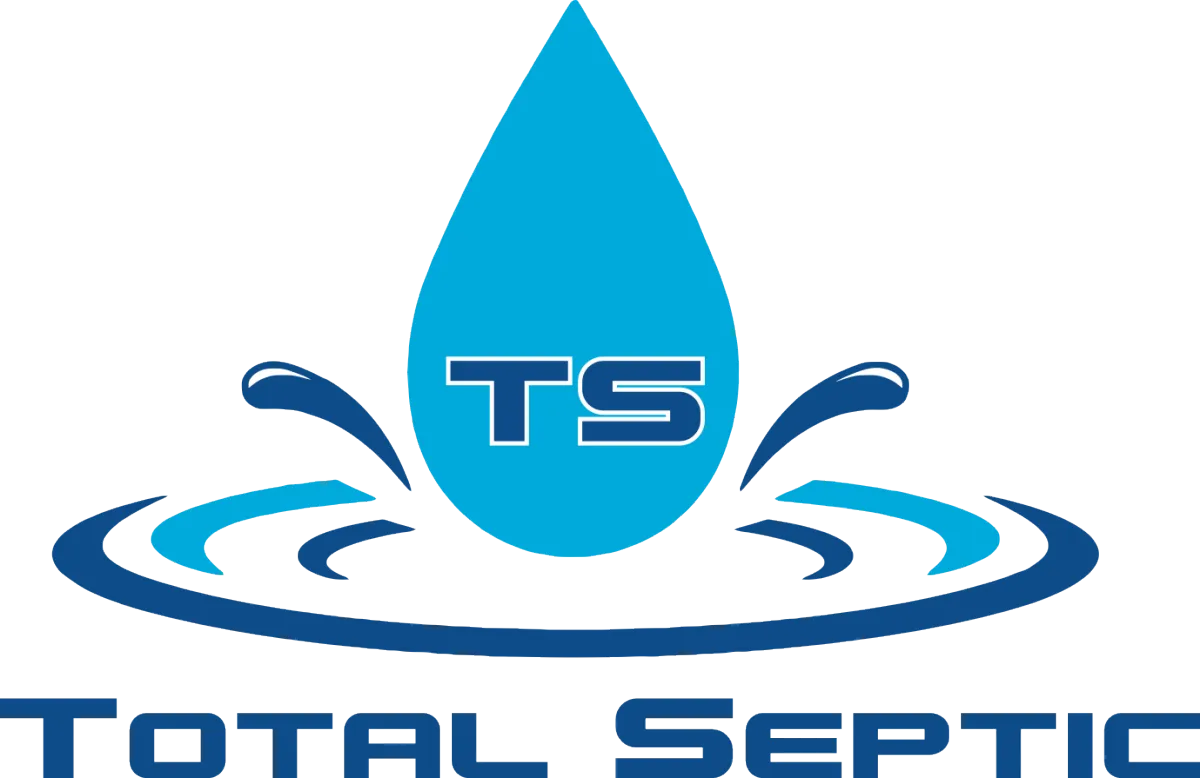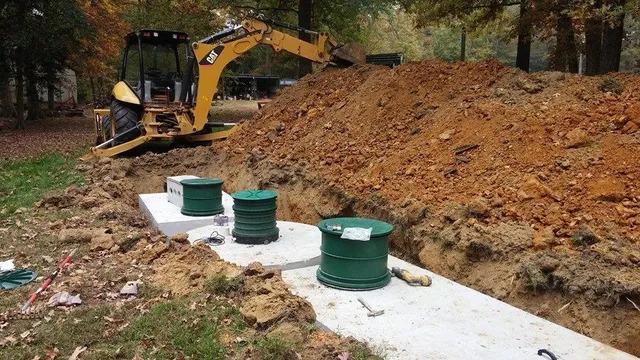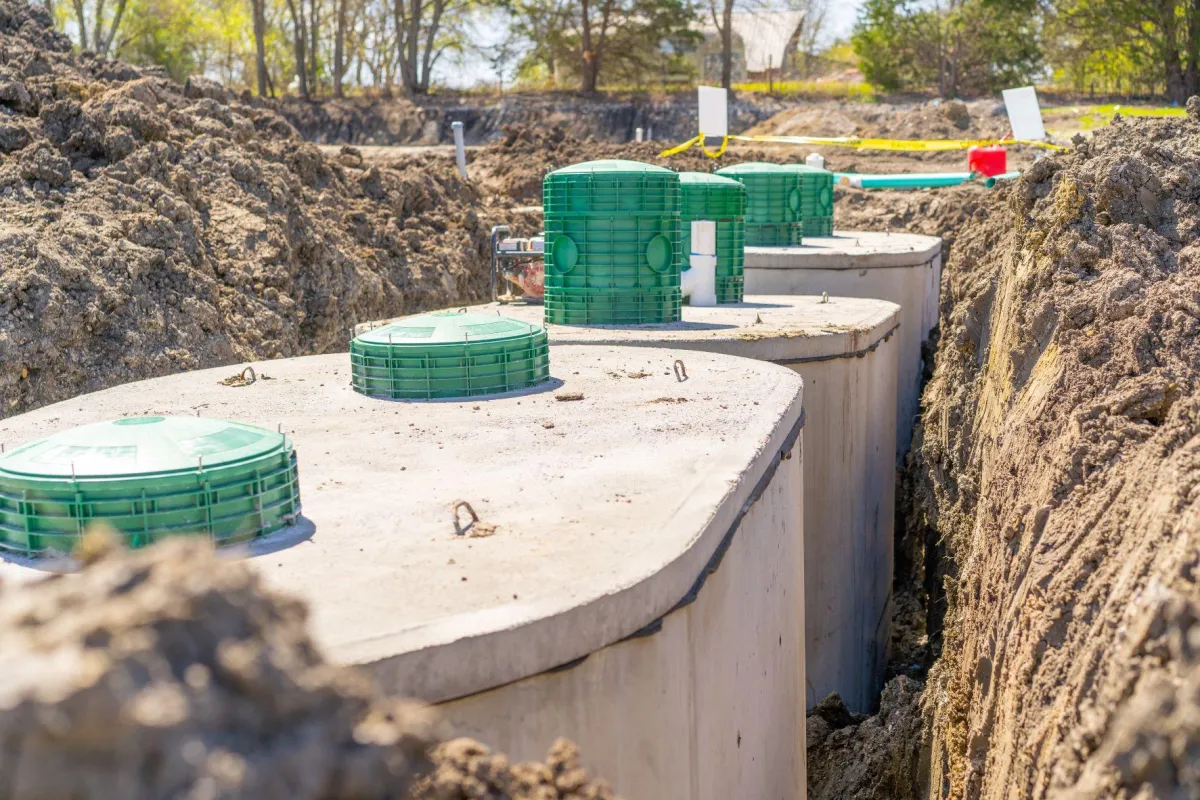
Serving Texas Counties: Collin, Grayson, Dallas, Denton, Rockwall, Fannin and Hunt
Septic Installation around North Dallas,Texas
Total Septic is Committed to superior quality and results!

AVOID COSTLY MISTAKES:
Do NOT hire an excavating contractor without first reading our free guide:
The ULTIMATE Excavation & Septic "Success Guide."

Septic Installation around North Dallas,Texas
When your property isn’t connected to city sewer lines, a properly installed septic system becomes essential. In around North Dallas, Texas, where soil types vary from dense clay to sandy loam, septic system design and installation require precision, local expertise, and regulatory compliance. This guide explains what a septic installation involves, the benefits of hiring a local professional, and how to confidently move from evaluation to a fully functional system.
How Can We Help?


What Makes Septic Installation around North Dallas Unique
The local soil and water table play a major role in system design. A one-size-fits-all solution simply doesn’t work here.
Local Expertise: North Dallas Authorities has distinct requirements for permits, setbacks, and inspection schedules.
Soil Testing: Each site requires a soil evaluation to determine the soil type and characteristics for your property.
System Design: The slope, elevation, and proximity to structures determine the best setup—whether it’s gravity-fed, pressurized, or aerobic.
By tailoring your system to the land, you prevent backups, protect your groundwater, and ensure reliable performance for decades.
Benefits of Professional Septic Installation around North Dallas,Texas
Hiring a professional for septic installation means peace of mind, long-term savings, and fewer headaches.
Here’s what you gain from local expertise:
Accurate Site Analysis – Proper soil evaluations and elevation checks lead to fewer surprises during installation.
Regulation Compliance – Texas counties have strict rules on setbacks, tank sizes, and maintenance plans.
Custom System Design – You’ll get a setup built for your household size and soil conditions.
Fewer Repairs Later – Using quality tanks, pipe materials, and field designs ensures years of dependable service.
Warranty & Documentation – You’ll receive maintenance instructions and a detailed site layout for future use.
Common Septic Systems Installed in North Dallas Texas
Each property is different, and so is every septic system. Here are the most common setups for homes across North Dallas:
ATUs, Drip,LPD Conventional Gravity Systems
Ideal for large lots with well-draining soil. Wastewater naturally flows into the drain field for treatment.
Low-Pressure Dosing Systems
Use pumps to distribute wastewater evenly when gravity isn’t enough.
Aerobic Treatment Units (ATUs)
Add oxygen to the treatment process, breaking down waste faster and producing cleaner effluent.
Drip Dispersal Systems
Deliver treated water underground through tubing—an eco-friendly, space-saving solution for small lots.
See Our Excavation & Septic Services

✔️ Commercial Excavation
✔️ Residential Excavation
✔️ Demolition
✔️ Dozer work
✔️ Septic inspections
✔️ Septic system pumping
✔️ Septic installs traditional systems
✔️ Septic tanks - aerobic systems
✔️ Septic tanks - Plastic/poly
Quality Services Launched FAST!

✔️ Septic tanks - Concrete
✔️ Sewer repairs
✔️ Trenching
✔️ Utilities Trenching
✔️ Pump Outs Installs
✔️ Maintenance Contracts
What Are You Waiting For?
The Process of Hiring for Septic Installation around North Dallas,Texas
A smooth installation process depends on clear communication, testing, and planning. Here’s what homeowners can expect step-by-step:
1. Initial Consultation
Discuss your home’s water usage, lot size, and long-term property plans.
2. Site & Soil Testing
Soil samples and percolation tests are performed to measure absorption rates and determine the best system type.
3. Design & Permitting
A licensed designer creates the layout, submits it to North Dallas for review, and secures the proper permitting authority.
4. Excavation & System Setup
Crews install the tank, trenches, and drain field according to code, ensuring slopes and depths are precise.
5. Electrical & Component Installation
Aerators, pumps, and control panels are wired to meet electrical safety standards.
6. County Inspection & Start-Up
The system is pressure-tested and inspected before final approval.
7. Site Restoration
The area is graded, compacted, and cleaned up for landscaping.
How to Prepare Your Property
You can speed up installation by preparing in advance:
Mark your property lines and any underground utilities.
Identify where future patios, gardens, or driveways will go.
Provide access for heavy equipment and materials.
Keep pets and vehicles away from the work zone.
Proper preparation helps crews stay efficient and minimizes disruption to your yard and driveway.
Protecting Your Investment After Installation
Once installed, routine care keeps your system working properly:
Pump the tank every 3–5 years.
Avoid flushing grease, wipes, or chemicals.
Keep trees and heavy objects off the drain field.
Schedule annual inspections, especially for aerobic systems.
Maintain records of permits, maintenance, and inspections.
These simple habits protect your investment and prevent costly repairs down the road.
Why Local Knowledge Makes the Difference
The permitting process, inspection requirements, and environmental rules are unique to the region. Professionals familiar with the area know how to navigate regulations quickly and efficiently—saving you time and avoiding failed inspections.
From selecting the right system to managing installation and documentation, working with someone who understands the land is the surest way to get a system that performs for years without worry.
Start Your Septic Installation around North Dallas, Texas
If you’re planning a new build, upgrading a system, or replacing an old tank, the right septic installation can protect your home and property for decades.
Work with experienced professionals who specialize in local soil conditions, code compliance, and efficient installation.
A well-designed system isn’t just about plumbing—it’s about protecting your home, your land, and your future.
Facebook
Google Plus